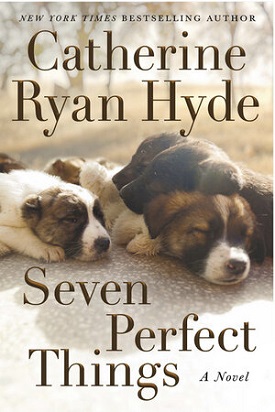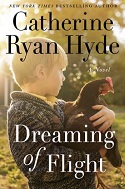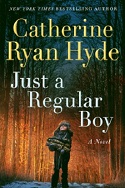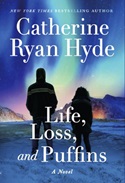 Synopsis:
Synopsis:
Thirteen-year-old Abby Hubble lives in the Sierra Nevada foothills of California with her mother, Mary, and her controlling, emotionally and psychologically abusive father, Stan.
One day Abby witnesses a man toss a bag into the nearby river. She soon realizes that the bag contains seven puppies. Diving in to rescue all seven, she knows she won’t be able to bring them home. Afraid forthe fate that will befall them if she surrenders them to the pound, she takes them to an abandoned cabin that she and her friend discovered. All she can offer them is her promise to be back the next day.
Elliott Colvin has just buried his beloved wife of many years, Pat. For him, life has lost meaning. Seeking solace, he retreats to the hunting cabin he last visited years ago, before Pat’s long illness. But what he discovers is not what he expected. Not only were the locks cut off the cabin and nearby shed, and all of his valuable possessions stolen. But seven puppies have taken up residence in the shed and are being cared for by one determined girl with an indomitable heart.
Abby and Elliott quickly forge a friendship, and Abby begins imagining how much better her life — and the puppies’ lives — would be if her mother were married to Elliot instead of her father. She is convinced that if they meet, Mary and Elliott will like each other.
But Stan abruptly drags the family to Klamath, Oregon. Abby and May have to decide how long they’re willing to defer happiness, and what they’re willing to risk to find it.
Once again, beloved bestselling author Catherine Ryan Hyde delivers an emotionally rich novel about finding love . . . in unexpected places.
Review:

Author Catherine Ryan Hyde possesses a rare talent. She is able to construct straight-forward, seemingly uncomplicated stories about people whose lives are changed by unforeseen circumstances. But in reality, her tales are mesmerizingly profound commentaries about human nature — full of insight, compassion, & wisdom. Her books are quiet masterpieces about unremarkable people who prove to be heroic, resilient, & consequential in others’ lives. She says that in her writing, she returns to a single question: “What is our responsibility to each other?” because she is “fascinated by people who help not because they have to but because they can.” In Seven Perfect Things, Hyde returns to that theme, telling a story about joy, where it can be found, how to recognize it, and, most importantly, having the courage to hang onto it once you find it.
Abby’s home is an unhappy one. Her father is boorish, overbearing, and perpetually unhappy. Her mother, Mary, lacks self-esteem and tiptoes around Stan, fearful of raising his ire. She ensures that she is home when he expects to find her there and his dinner is on the table when he gets home from work. She has to sneak off for lunches with her friend Viv, who supports her unconditionally and encourages her to leave and make a better life for herself and Abby, telling Stan she is at a quilting bee. Mary has saved up a small escape fund that hides away in her sock drawer.
Abby and her friend, Jamie, discovered a few months ago that the locks had been sheared off an old hunting cabin and shed situated in the woods above her house. The paved road leading to them turns into a rutted, twisting four-wheel-drive track arcing up a steep hill, nearly obscured by encroaching trees. The girls only entered the cabin once because it felt wrong to enter someone else’s home without invitation. When Jamie runs away to the cabin, Abby convinces her to go back home. Walking back down the hill to her house, Abby approaches the bridge and watches a middle-aged man emerge from a car, holding a burlap sack, swing it hard, and toss it over the railing into the river below. For just a split second, the bag seems to hesitate on the surface of the river. And in that split second, Abby sees the sack moving, not with the river’s current, but in a jerking fashion. She realizes that something inside the bag is alive.
In that split second, the trajectory of Abby’s life changes.
Abby is a strong swimmer — a member of her school’s swim team — but she risks her own life to navigate the river’s strong current and reach the heavy bag. She manages to retrieve it and navigate it onto the muddy bank, relieved to see that whatever is inside it is still moving. Using her penknife to cautiously slash the bag open — apprehensive that she may have just rescued “something you wouldn’t want to save” — she is shocked when a puppy comes tumbling out. Gradually, six more puppies emerge from the bag! They are adorable and instantly swarm her, leaving muddy paw prints all over her clothing. “Now what the heck am I supposed to do with all of you?” Abby asks them.
Hyde is an expert at creating young characters who spring to life in reader’s minds, their voices perfectly believable and endearing. Abby is no exception. She is resourceful, resilient, and wise beyond her years. She knows she can’t bring seven puppies home but cannot bear to surrender them at the pound after being informed of their likely fate in a county where dumping animals is not unusual, but adopting them is. So she decides that since the cabin has been abandoned for some time, she will keep the puppies in the shed until she can find loving homes for them. As Abby considers the puppies’ perfect faces, she knows that there is nobody to help her, and she must rely on her own instincts and ingenuity . . . because seven tiny lives depend on her. She has been reluctantly “thrust into a world where such perfect little beings could be treated as worthless. She knew she had been living in that world all along, but she resented having been forced awake. Forced to recognize it.”
I just think it’s odd how we parse out our empathy. Why we only have empathy for those who remind us most of ourselves. I’m not saying I don’t understand it. Sure, it’s easy to have empathy for someone who’s just like us. It comes naturally. I just think it’s a shame we can’t take it a bit further. I can’t help wondering what the world would be like if our empathy muscle were a bit more developed. . . . Just anecdotally, from my own experience, I’m beginning to play with the idea. I’m starting to think it might be true. ~~ Elliott
Abby doesn’t count on Elliott, the owner of the cabin, returning after an extended absence. A handsome fifty-two-year old engineer who is exhausted and bereft following the death of his wife, Elliott only wants peace and quiet in a place where he might feel a bit better. His intent is to “run away from my life and exist in the silence.” He has just endured the funeral where well-meaning friends and acquaintances have insufferably offered platitudes like “such a terrible disease. Thank goodness she was gone before all that awful stuff happened, . . . It’s a blessing.” Elliott loudly responds, “It’s not a blessing. It’s a damn tragedy,” causing all conversations around him to suddenly stop. “Don’t try to tell me the worst time of my entire life is a blessing.”
But when Elliott arrives at the cabin, he discovers that his locks have been cut off, his possessions stolen, the cabin is filthy because the door was left open . . . and a precocious thirteen-year-old is sheltering seven puppies in his shed. Elliott is not a man who wallows in self-pity or asks “Why me?” when confronted with challenges. Rather, he faces “life on its own terms.” Elliott’s realization that he has been been denied the refuge he sought pushes Elliott toward his breaking point, as though the universe is “picking on him. It was more than he was able to dismiss as fair.” He has no intention of being Abby’s savior, especially at a time in his life when he is incapable of saving himself.
Hyde compassionately and compellingly relates how Abby and Elliott encounter each other and establish a tenuous friendship. Abby discovers and teaches Elliott that it is literally “impossible to not be happy with seven puppies climbing all over you. It literally can’t be done.” Her instincts immediately tell her that Elliott, unlike her father, is trustworthy. They work out an arrangement that will temporarily allow Abby to keep the puppies on Elliott’s property, and he convinces her that she must tell her mother the truth about her activities . . . and those delightful puppies.
The story moves at a steadily engrossing pace as the seven perfect puppies and Abby’s unwavering devotion to them serve as the impetus for Elliott to do what fascinates Hyde: he agrees to help Abby and Mary not because he has to — after all, he just met them and has no responsibility for them — but because he has the means and desire to do so. Like Abby, he becomes devoted to the puppies, and learns that, although he must journey through mourning his wife, his grief does not have to define the remainder of his life. He knows, in fact, that was not what she wanted for him. She told him “loudly and clearly” that after her death, she expected Elliott to “get out there and live. Or else” she would “come back and haunt” him.
But danger lurks and devastating developments threaten the chance for Abby, Mary, and Elliott to find happiness. For Mary, it is a reckoning as she must either recognize her own worth and inherent power, or forever surrender herself to an unhappy, dysfunctional marriage with a man who is angry and unhappy all the time. If Mary, who loves poetry, allows, in the words of Emily Dickinson, her prison to become her friend, she will also consign Abby to life with a father who has no real interest in her or her future. To Stan, Mary and Abby are possessions he feels entitled to dominate and control.
As always, Hyde’s characters are empathetic and endearing, their experiences believable. She explores how each of them learns a new way to relate to the world and the people around them. For Abby, it’s a critical time in her young life when she gives voice to her feelings and undertakes the awesome responsibility of caring for and protecting the puppies. Mary must face down her fears — of Stan, resignation, and failing her daughter — and find out if she can create a happy, secure life for herself and her daughter. And Elliott must decide if he can honor his late wife’s wish that he, in time, will be happy again despite losing her and the beautiful marital relationship they shared. None of the three main characters is without flaws, but all deserve a better life than they are living as the story opens, and Hyde tests their resilience, strength, and resolve in an entertaining and engrossing story that illustrates once again why Hyde is a master at crafting emotionally satisfying tales that leave readers feeling better about the human condition for having read them.


















Comments are closed.